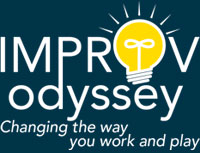Improvisation is an ideal way to practice the art of Crisis Management
Transformation: The Value of Emergency in Play or Creating Healthy Crisis “In the middle of difficulty lies opportunity.” ~Albert Einstein How do you begin to effect transformation? What sparks change? Answer – crisis. What happens during a crisis is critical for change. …reform is usually possible only once a sense of crisis takes hold. Good leaders.. read more →
Play is Essential to Life & Work
I got this link from a colleague, Rob Adler. Again, here is someone else who sees what we need as a society and how important play is. This argues for the same paradigm shift Improv Odyssey advocates. There are people out there who can lead you back to that essential ingredient that not only relieves.. read more →
The Difference between Spolin Games and Popular Improv
There is a profundity in Spolin’s work that is hard to capture and commoditize. It cannot be learned intellectually, but must be experienced firsthand to really be understood. There are only a handful of teachers carrying on her tradition, myself being one of them.
Improvisation began with Spolin. But other popular forms have emerged as more popular and have swept the world. I will try to explain the reason for this. read more →
The Seduction of the Teacher
The Trap “Students who regard an instructor highly will tend to adopt that instructor’s attitudes, orientations, and values. This is a seductive phenomenon because it can lead to the ego-enhancement of instructors who have not reached full psychological maturity. This ‘ego-stroking’ can then motivate instructor behaviors which do not have the personal development of participants.. read more →
The Power of Play and the Need for Playing
Play creates happy emotional condition of the organism-as-a-whole. Play involves social values, as does no other behavior. The spirit of play develops social adaptability, ethics, mental and emotional control, and imagination. These are the more complex adjustments a child learns through play. In play, there are adjustments to new situations constantly. Play experience can prepare.. read more →
A Question of Evaluating Students
I recently got a letter from a teacher who uses Spolin Games in the classroom. She asked an interesting question: …Here’s my question: what theatre game would you recommend I use in evaluating the ability level or strength of a 4-6 grader performing improvisation? In other words, which game might let me know which student.. read more →
Direct Experience and Peak Experiences
“What we are after is a direct experience!” — Viola Spolin I used to think that a direct experience is the same as what Abraham Maslow called the ‘peak experience’. Maslow coined the term to describe what other people have referred to as a ‘religious experience’ as in a born again feeling where the subject.. read more →
Playing Creates Community
In our ever more complex and technological era, true person to person interaction is lost as we interact with each other via technology instead. (witness this blog) The technological revolution has brought us closer in one respect, but the need to interact in a wholesome way within our local community, person to person, is still.. read more →
Why Freeze Tag is the Anti-Improv Game
“The heart of improvisation is transformation” – Viola Spolin Playwriting: Manipulation of situation and fellow actors; an unwillingness to believe that a scene will evolve out of the group playing; not understanding the focus; deliberately using old action, dialogue, information, and facts (ad-libbing) instead of spontaneous selection during improvisation; not usable in impeovisational theater. “Stop playwriting!” — Improvisation.. read more →
What Does it Mean to Improvise?
“Creativity is not the clever rearranging of the known.” – Viola Spolin Creativity is a state that allows us to touch the unknown and to bring it into the phenomenal world: To make the invisible visible. The unknown is a territory that holds all possibilities, until it is revealed. The act of revealing – that is.. read more →







